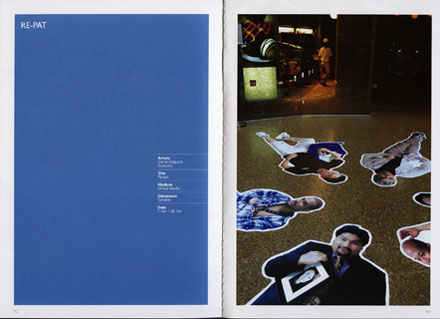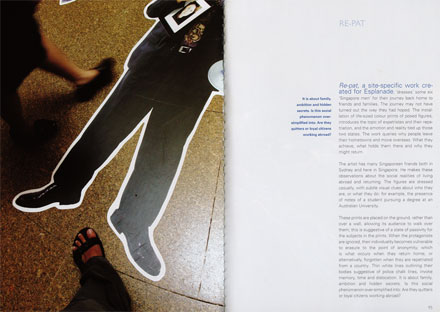

 |
 |
 |
 |
 |
 |
 |
 |
||
|
In this new work showing for the first time in Singapore's new performing arts centre, the photographer
Garrie Maguire explores cultural clichés and the interplay between perception, appearance and reality.
Maguire uses the subject matter of expatriate Singaporean young men to explore what it means to be an expatriate,
a Singaporean. He uses large colour photographs that pose as many questions as they provide clues to answers.
What is the role of dress in defining who we are? Or more importantly from a traditional Singaporean point of
view, how do we wish to be viewed by others?
The dress chosen by the subjects gives clues to their individual passion and profession. From a cursory glance the viewer's first impression is that they are all casually dressed. On closer scrutiny the viewer may find that on each individual there are hints through their dress that give greater insights into the roles that they play in Australia; codes that can be deconstructed to help answer questions such as are they now aliens in their own country? Do they feel Singaporean or Australian? Are they now visitors in their own birth place. Subtle visual hints are encoded in the images and play on long artistic traditions in both the East and the West. These may be a backstage pass in a back pocket belonging to a choreographer; or it may be folders and notes belonging to a student pursuing a degree at an Australian university. These visual clues can be personal, such as man clutching a photograph of his wife in one hand, or a rice bowl in another tells the story of an individual who has chosen to live overseas with his Australian partner and pursue a successful career. The work also explores the issue of individuality versus collectivism through its installation. The photographs lie passively like an advertisement stretched out on the floor. They are totally oblivious to the viewer who might pass by or step onto them. If these individuals were back in Singapore they may appear to be anonymous, blending into the city's mass of humanity. The fact that they are lying passively highlights the viewer's option to either walk around or trample on them. The act of stepping around and engaging with the images forces the participant to take a closer look at them as individuals and confront who they actually are and recognise their presence. Conversely the act of stepping onto them could be to dismiss them as anonymous; just as many expatriates who leave Singapore are forgotten for once they leave the country they are perceived as irrelevant and invisible. It is hoped that the majority of viewers will take time to scrutinise these works and in the process reflect and gain insights on patriotism and expatriates, on individuality and collectivism. Lye-yew Yeo Sydney, Australia |
It is about family, ambition and hidden secrets. Is this social phenomenon over-simplified into: Are they
quitters or loyal citizens working abroad ?
Re-pat, a site-specific work created for Esplanade, 'dresses' some six 'Singapore men' for their journey back home to friends and families. The journey may not have turned out the way they had hoped. The installation of life-sized colour prints of posed figures, introduces the topic of expatriates and their repatriation, and the emotion and reality tied up those two states. The work queries why people leave their hometowns and move overseas. What they achieve, what holds them there and why they might return. The artist has many Singaporean friends both in Sydney and here in Singapore. He makes these observations about the social realities of living abroad and returning. The figures are dressed casually, with subtle visual clues about who they are, or what they do: for example, the presence of note's of a student pursuing a degree at an Australian University. These prints are placed on the ground, rather than over a wall, allowing its audience to walk over them; this is suggestive of a state of passivity for the subjects in the prints. When the protagonists are ignored, their individuality becomes vulnerable to erasure to the point of anonymity, which is what occurs when they return home, or alternatively, forgotten when they are repatriated from a country. Thin white lines outlining their bodies suggestive of police chalk lines, invoke memory, time and dislocation. It is about family, ambition and hidden secrets. Is this social phenomenon over-simplified into: Are they quitters or loyal citizens working abroad?  
|
|
 |
 |
 |
 |
 |
 |
 |
 |
|
| Some Other Men | Occupation | Edges | toHave & toHold | Awaiting Approval | Gods + Warriors | re-Pat | BAD FiLM |